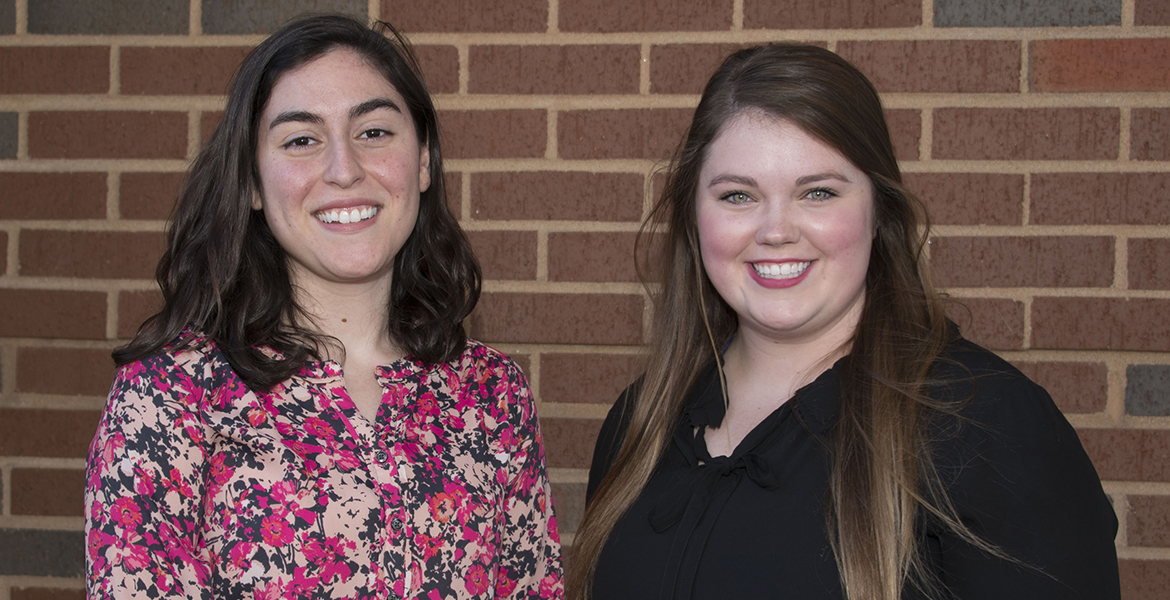
Marriage and Family Therapy graduate students awarded fellowships
Monday, January 29, 2018
Oklahoma State University graduate students Jamie Bechtelheimer and Emily Tucker have been named fellows in the Now is the Time: Minority Fellowship Program-Youth. Bechtelheimer and Tucker are master’s students in the marriage and family therapy program in the College of Human Sciences.
As recipients of the fellowship, Bechtelheimer and Tucker will have a professional training appointment in a community of other students and professionals who hold similar professional interests. The MFP awards stipends to students who hold the fellowships, facilitates leadership development, and provides professional guidance with the aim of deepening the skills sets and knowledge base of the fellows in areas related to minority mental health research and services.
The American Association of Marriage and Family Therapy established the Now is the Time: Minority Fellowship Program-Youth in 2014 with funding from the Substance Abuse and Mental Health Services Administration. The fellowship program supports the training of practitioners and researchers in culturally competent mental health and substance abuse services, treatment and prevention.
Bechtelheimer currently practices therapy with individuals, couples and families through the Center for Family Services, and also interns at Youth Services of Tulsa (YST), working with "at-risk" adolescents and young adults who may be run-aways, homeless, first-time offenders, or who are struggling in school.
“The clients that I see at YST are ethnically and racially diverse and include many individuals who identify as LGBTQ,” Bechtelheimer says.
Bechtelheimer also enjoys providing therapy to adolescents and their parents.
“This is my favorite population to work with, because so many parents struggle to adjust as their kids transition to adolescence,” Bechtelheimer explains. “I enjoy assisting the parent and child with rebuilding their trust and educating parents on how to best support their kids through difficult times.
Following graduation, Bechtelheimer wants to work in a school setting, providing therapy for children and adolescents and their parents in an effort to support the child's academic success and to strengthen the parent-child relationship.
Tucker’s goal after graduation is to work with individuals with disabilities. While pursuing her master’s degree, she serves in a graduate research assistantship for the Oklahoma National Core Indicators Project. She conducts interviews with individuals receiving services from Development Disabilities Services.
In addition to providing therapy for clients through the Center for Family Services, Tucker volunteers with a student-led group on campus called REAL Community (Relationships, Engagement, Advocacy, and Learning). The group works to build a network of support for individuals with (intellectual and developmental) disabilities.
“The goal is to build natural peer support for them as they transition to careers,” Tucker says.
Through REAL Community, OSU students, faculty and staff connect with individuals with disabilities on campus in a variety of ways each week. Participants eat lunch together and participated in book and writing clubs.
Objectives of the fellowship program include reducing health disparities and improving behavioral health care outcomes in racially and ethnically diverse populations. The fellowship aims to increase the number of culturally competent master level behavioral health professionals serving children, adolescents and populations in transition to adulthood.
As an agency within the U.S. Department of Health and Human Services, the Substance Abuse and Mental Health Services Administration leads public health efforts to advance the behavioral health of the nation. Its mission is to reduce the impact of substance abuse and mental illness on America's communities.
